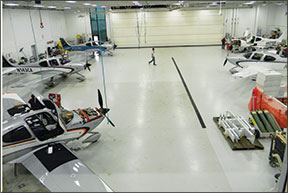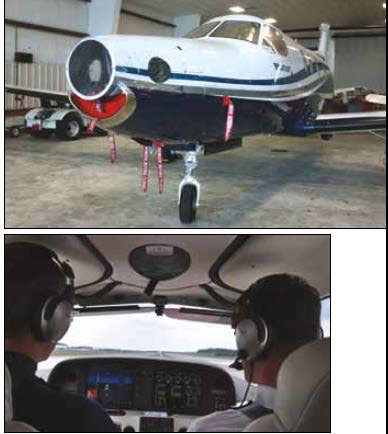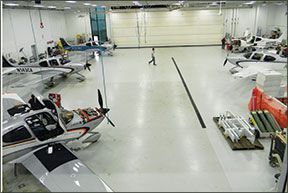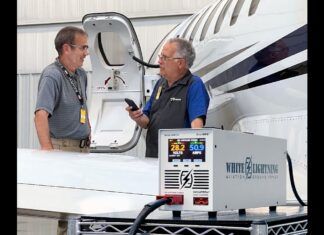It can be said that a skilled and reliable aircraft maintenance shop is an aircraft owner’s biggest asset. For a shop, a loyal and fast-paying customer keeps the doors open. That’s why it’s important for the owner and the shop to keep this valued partnership healthy.

Unfortunately, this isn’t always easy. Money collection issues, blown schedules and cost overruns are just a few of the things that can send an otherwise healthy working relationship off the rails.
Whether you’re looking for a new shop to wrench your aircraft or already have a shop that you are happy with, here are some insider tips to preserve a positive and lasting relationship with a maintenance provider.
Owner-Assist
Perhaps the closest working relationship is an owner-assisted project. While there are several benefits, not all shops are welcoming. You’ll need to ask about the shop labor rate for such work.
Bill Foley, who’s been doing owner-assisted annuals on his Bonanza for over 10 years, has a cooperative shop. Still, he does the right thing so the shop can still make a profit. He’s also careful that the aircraft doesn’t tie up space on the shop floor any longer than it would take the shop to complete the work on its own.
“I open the aircraft, the IA inspects the plane and we go over his discrepancy list. I usually have several items of my own that I want done. We reach an agreement on which items I will do and which will be done by one of the shop mechanics. While there is some cost savings, it’s important to remember that the shop is in business to make money, so there must be some added monetary benefit to them. In my case, I pay the full price of a normal inspection, even though I do the grunt work, including full lubrication of the airframe, plus ground runs and flight testing. I also buy all of my parts from the shop,” Foley told us.
Perhaps as important as the savings is the knowledge that’s gained.
“The early annual inspections that I participated in gave me the added practical experience that I needed to complete my A&P rating. During the period between annuals I can now perform and sign off other needed maintenance work that comes up between inspections,” noted Foley.
Quotes and Proposals
In our view, major work should never be accomplished without a written price quotation. Don’t confuse a job proposal with a price quotation. Some proposals are an outline of the job, but might not be a firm price quotation. Are there hidden costs, including freight charges to order equipment? Freight charges can add hundreds of dollars to a project.

Consider even a minor avionics upgrade. While it’s easy to e-mail photos of the instrument panel so the shop knows what it has to work with, this might not be enough information for the shop to issue a firm quote. With avionics work, repairing existing wiring and replacing supporting accessories add to the bottom line. The competitive nature of aftermarket upgrades often means low-balled price quotes to get the customer in the door. Once the project is underway, you could discover that the project requires more labor and equipment than anticipated. Avoid this trap by bringing the aircraft to the shop during the quotation stage.
Once the shop evaluates it, they should be able to provide an accurate quotation. Even then, there could be other variables that the shop won’t see until it disassembles the panel, engine or opens the airframe. Still, good shops might build that variable into the quote. Major projects can snowball once the job gets started. While this generally isn’t the fault of the shop, it still has to get your approval for cost overruns. A simple call or text is all takes to keep you informed. In our estimation, you aren’t obligated to pay for work you didn’t approve.
Flight Testing
Whether it’s an engine replacement or major avionics retrofit, some maintenance work will require flight testing. Shop hangar-keepers insurance policies may not cover flight testing. A shop that doesn’t have proper insurance in place (or doesn’t advise you that they’ll be flying the aircraft without you onboard) has no business flying your aircraft, no matter the experience level of its pilot.
If you offer up the aircraft for the shop to fly without you being present—or if they hire a pilot to fly it on your behalf—you need to make certain the pilot meets the minimum requirements in your insurance policy.
It’s your responsibility to provide the shop with a certificate of insurance, which describes the coverage in effect and also includes the shop and the pilot as additional named insureds under the liability coverage. The coverage should include a waiver of subrogation with respect to physical damage to the airplane. This waiver is a promise from the owner and from his insurer not to come after the shop for damage that they cause to the airplane while doing the test flight. If the pilot doesn’t meet the minimum requirements, neither the shop nor the owner will be covered for the test flight.
The other consideration for flight testing is a financial one. It’s a reason why you’ll want to handle money matters we’ll in advance of picking up the aircraft. Consider the following scenario. You arrive at the shop at the end of the project to pay the invoice and also perform a flight test with a shop representative. A dispute over the amount of the invoice results in an argument between you and the shop. Maintenance flight testing is stressful and risky. You don’t need the distraction of financial disagreements when your mind should be focused on flying the aircraft. Ask them how much money you owe before you show up at the shop to pick up the aircraft. Good shops will beat you to the punch. Better shops keep you informed along the way.
Handling the Money
An uncomfortable part of the owner/shop relationship is dealing with money. It doesn’t have to be awkward if you recognize that the shop is simply there to make a living.
While there might be a certain level of camaraderie that exists during a large project, the shop isn’t there to be your friend and it certainly isn’t in the business of loaning you money. Think about the number of retail businesses that will allow you to leave with a product or service without paying on the spot. There aren’t many, but there seems to be an assumption among some aircraft owners that it’s acceptable to send payment after leaving with the aircraft (unless the shop agrees).
We talked with a few shop managers, including Joel Glover, the director of maintenance at Advanced Aircraft in Lancaster, Pennsylvania, to get a feel for how they handle payment at the end of a project.
“There are select regular customers that don’t use credit cards but instead, send payment immediately after flying the aircraft home. These customers have proven themselves. But for others that I don’t know as well, payment at the time of pickup is absolutely mandatory,” Glover said.
Cathy Rudd, a principal at Treasure Coast Avionics in Fort Pierce, Florida, enforces payment at pickup.
“We use the car dealer rules when it comes to payment. At a dealer, you can’t pick up your car without paying the bill. We’re no different than any other service business. We have employees to pay, utility bills and equipment calibration bills that need to be paid. For the most part, our good customers understand that and respect the policy,” Rudd told us.
During larger projects that might last longer than anticipated, don’t be surprised if your shop calls looking for payment along the way, especially if you make the decision to add more equipment than what was quoted.
Still, payment milestones should be spelled out in the original quotation. For example, a shop might require a certain amount of money to secure a spot on its schedule and then require another deposit when the job commences. If you agree to these terms, the shop expects you to follow through, just as you expect it to complete the project on time.
If you plan to pay with a credit card, you should speak up before the job begins. While most shops honor major credit cards, some might charge an additional convenience fee to cover the banking costs associated with credit card merchant accounts.
We heard from one owner who refuses to do business with his avionics shop again because it charged him several hundred dollars in credit card fees—and didn’t tell him about it—while running his card. He was on vacation while the shop completed the project and the shop owner demanded his credit card number for payment. A business can’t charge your credit card without your consent. This likely violates the merchant/bank agreement. When offering up your credit card number for payment, ask the shop when and how much money they will debit the card.
Many avionics projects include the removal of equipment. While some of this equipment may be old or even inoperative, it’s still your equipment and it should be returned to you, unless the quotation includes the shop taking it in trade. But this must be stated in the quote.
Communication is Key
Good communication really is the key to an effective and healthy long-term working relationship. We’re not just talking about discussing payment terms and scheduling. You should be an active part of the project.
While scheduling a project or regular maintenance might be convenient for you while you’re away on business or pleasure, it might not be convenient for the shop. Be sure you are reachable if the shop needs to discuss something with you. Last, show your appreciation at the end of the job by saying thanks—after you pay your bill.


